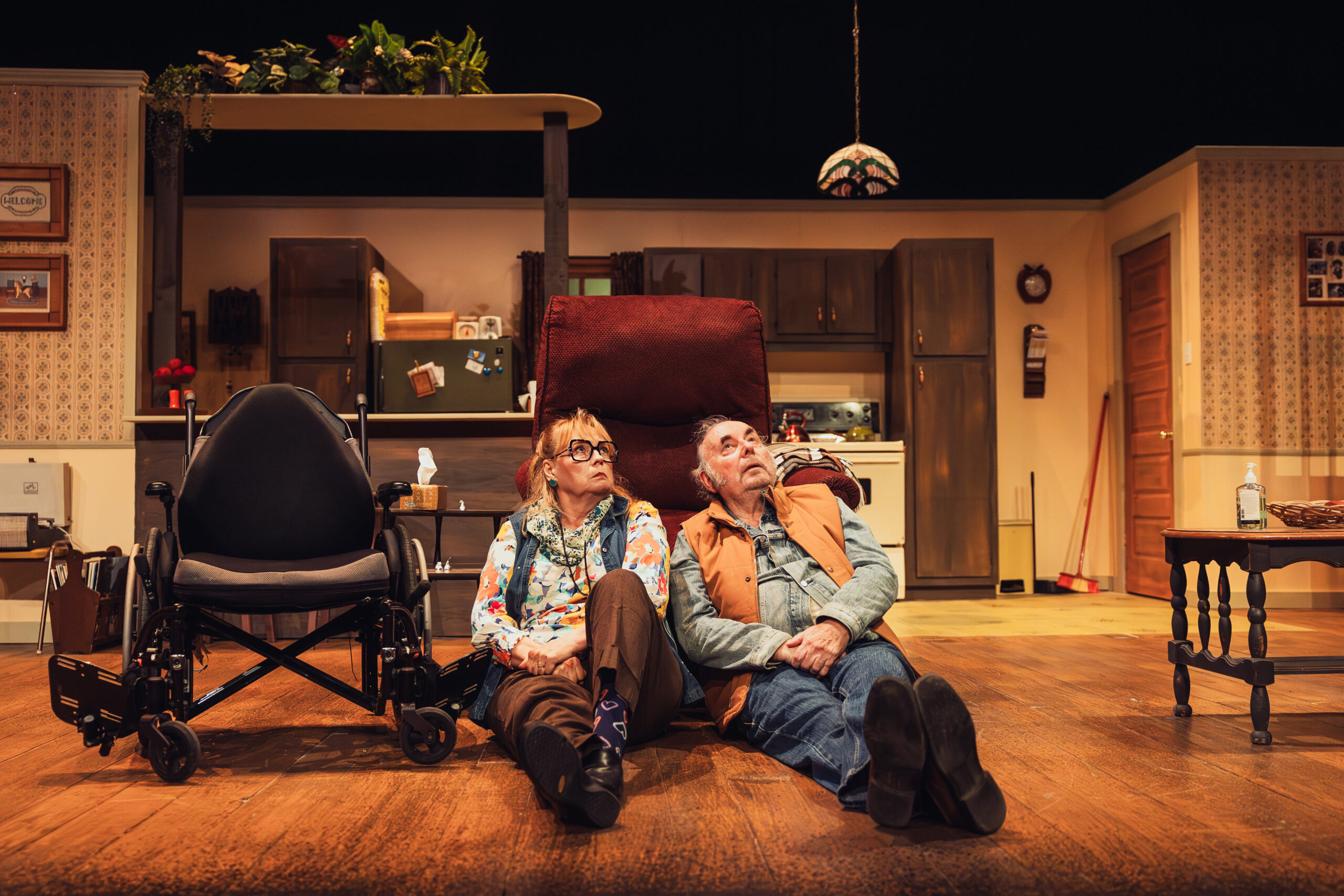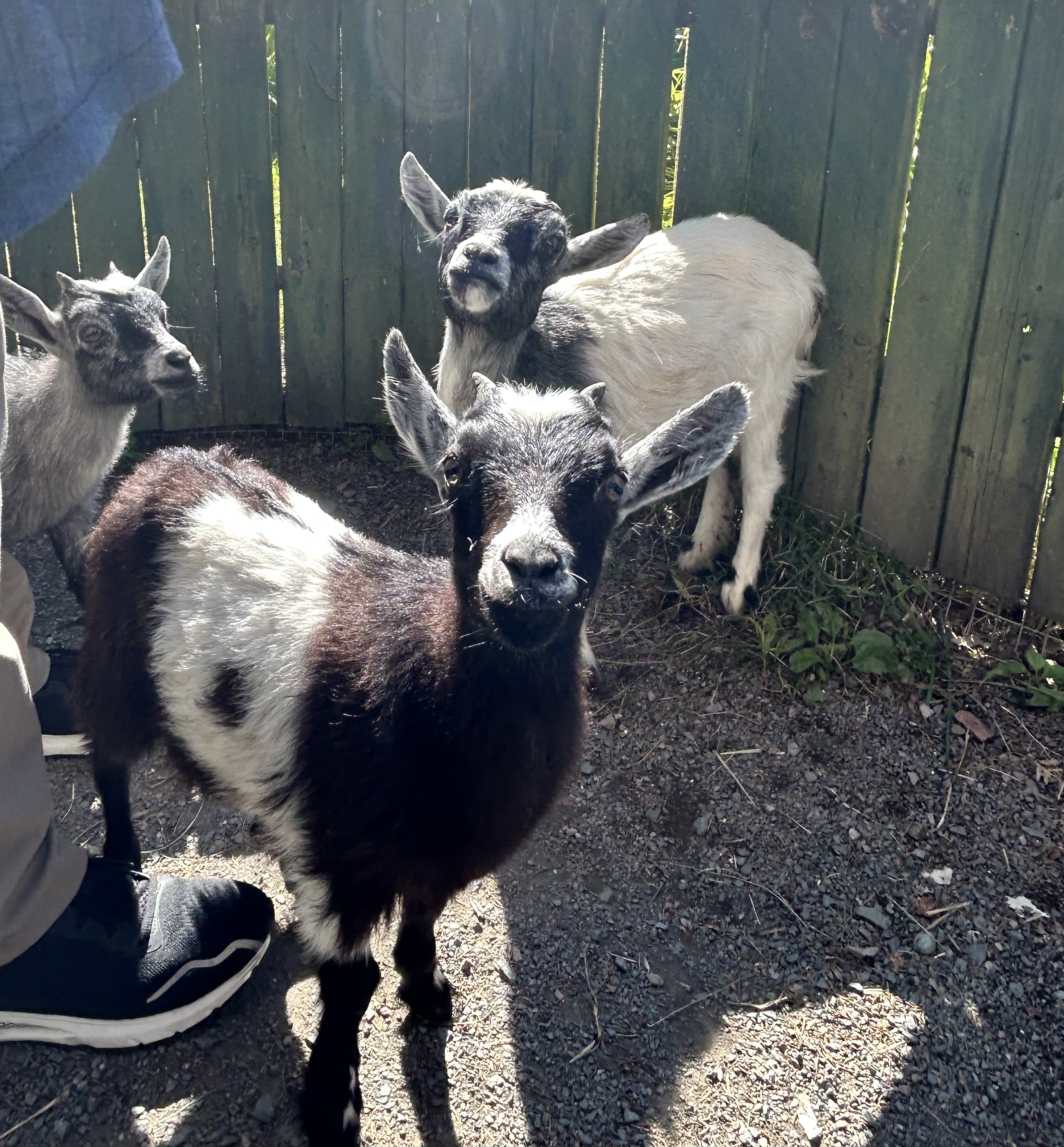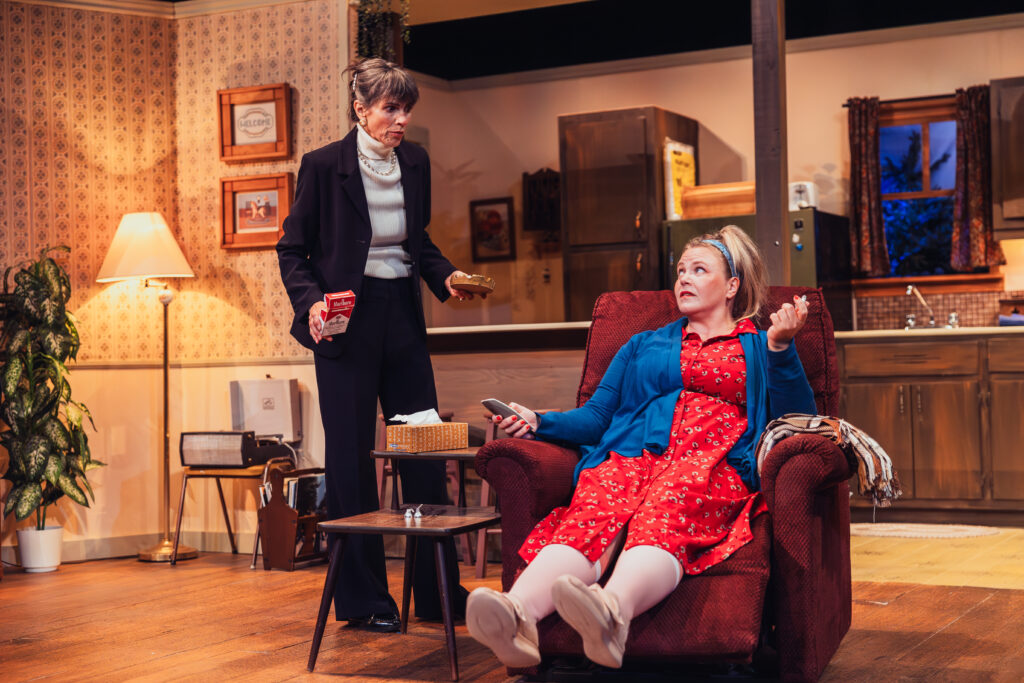
Martha Irving & Paul Rainville in Still Dancing. Photo by James Arthur MacLean
This past Saturday I was thrilled to join Eastern Front’s Theatre’s Field Trip series headed to Ship’s Company Theatre in Parrsboro. The passenger bus left Alderney Landing at 9:00am with Eastern Front Theatre’s Artistic Director Kat McCormack acting as tour guide, and General Manager Elsa Pihl helping to make sure everything ran smoothly and on time. Our superb bus driver was Kelly.
Our first stop was That Dutchman’s Cheese Farm Animal & Nature Park in Upper Economy where we had enough time to either walk through the trail to see and feed the farm animals, or to head inside to sample the cheese, peruse the gift shop, and to explore the Antique Store on the top floor. It was a difficult decision to make, but I really wanted to see the animals, so most of us set out for a fun adventure along the beautiful trail where we met a donkey, some chickens, some adorable goats, a horse, a cow, some emus, some sheep and pigs, and a Highland Cow. I wasn’t expecting the trail to be as strenuous as it was (uphill in both directions in spots!), so I felt really good that I got in some solid exercise before our epic lunch. I definitely would like to come back again to sample the cheese and to have more time to explore all the farm has to offer.





I had time to pop into the gift shop for three minutes and came out with TWISI’s new mascot: Floraidh Catrìona the Highland Cow. I am not to be trusted with currency.


We stopped for lunch at the Harbour View Restaurant, which is on the banks of Parrsboro Harbour, just across the water from Ship’s Company Theatre. The restaurant has a beautiful view, not just of the water, but also of the Parrsboro Lighthouse, which sits on a tiny island between the harbour and the Minas Basin. The tides here are incredible; while we were eating you could walk across the ocean floor to visit the lighthouse, as it was Low Tide, but by the time the play was finished the tide had come in and the island was completely surrounded by water. I ordered the lobster roll and French fries and they were both delicious. The portion size- especially of the lobster on the roll- was very generous and the fries were a perfect level of crispiness.

Our next stop was our feature destination: Ship’s Company Theatre to see a matinee performance of the World Premiere of Melissa Mullen’s play Still Dancing directed by Laura Vingoe-Cram.
We are introduced to a married couple, Ellen and Frank, who have been having a blast together for over forty years. Ellen and Frank are Baby Boomers in a way that reminds you that this was really the first generation of teenagers as we know them: a cohort defined by a love of music and iconic live concerts, flashy cars, blue jeans, and all the romanticized freedom that we have come to associate with the late 1960s and early 1970s when cars didn’t have seatbelts and once a teenager left their house there was no surefire way for their parent to track them down until they came home again. Now, however, Ellen and Frank are in their mid-sixties and they have two adult daughters, Allyson and Joanne, and an adult grandson, Kevin. Ellen has progressive Multiple Sclerosis and Frank is feeling his age whenever he has to lift her to and from her wheelchair, especially since he isn’t doing the proper transfer technique. At the heart of their lives is fun and music and dancing, all of which they try to continue to enjoy. They are not concerned about smoking or holding stubbornly to what independence they have jeopardizing their already precarious health and welfare. Their daughter Joanne and grandson Kevin, who live close and are in and out of their house constantly, are of the opinion that it’s more important that Ellen and Frank are happy and living on their own terms, even if it means their lives might be shorter, while Allyson, who lives away and isn’t home very often, is desperate to find ways for their lives to be more structured, healthy, and in line with what the doctor might order. When a sudden emergency extends Allyson’s stay tensions rise within the family over who should decide how Ellen and Frank live out this chapter of their lives, and we learn why Allyson is harbouring so much resentment toward her parents in the first place.
On the surface Mullen has written a very classic Canadian play about the rogue child returning home to the rural family and tensions mounting as they struggle to find their place again in the familial dynamic. I was struck, though, by how likeable this dynamic is, while still being rooted very, very firmly in reality. Ellen and Frank love one another and they are in love with one another in that magical way that you see sometimes with parents who have managed through all those decades of raising children and growing into fully formed adults to form a deeper bond with one another. They are also able to still see each other as they kids they once were. Joanne loves her parents and gets along well with them. She is patient, sensitive, and considerate, and she puts their needs and wellbeing, as well as that of her son, ahead of her own. Twenty-one year old Kevin isn’t portrayed as a hormonal attitude-factory either; he gets along well with his mother and his grandparents, and he has enough maturity and compassion to see when and how he can be helpful to them because he knows they have spent the last two decades pouring all their love and care into him. Individually the characters all have their flaws, of course, but together, this quartet is quite beautifully functional, and that feels more rare to see onstage.
This means the conflict really is all balled up in poor Allyson, who is well intentioned but also wholly grounded in her own Anxiety. Much of the joy of the piece comes from watching how much everyone loves each other, but most of the comedy comes at the expense of Allyson. Mullen works a deft balancing act here, having encouraged the audience to fall in love with Ellen and Frank throughout the first two thirds of the play, she then opens up the story a bit to allow us to see these parents decades earlier from their eldest daughters’ perspective. Allyson’s perspective is persuasive too and poignant. There is a darker side to living a life focused on pleasure rather than rooted in responsibilities. The ending suggests the beginning of a new healthier journey for Allyson as she takes stock of the ways in which she has been alienating the people that she loves and worries about the most.
I heard audience members mention that the play was almost “too relatable” in the way it portrays the strains that the natural progression of aging and illness put on a family. The dynamic is made even more real by the ensemble cast of five actors who have such beautiful depth of rapport with one another that you really believe that they are a family. Martha Irving plays Ellen oscillating beautifully between fun-loving good humour and frustration with her failing limbs as she struggles to do the things that she wants that bring her the most joy. Paul Rainville plays Frank, a sunny optimist who insists that no matter what happens, with him or with Ellen, he will handle it, and no one else need get involved: he has always taken care of things his way, and there’s no reason for that to change now. You can certainly see a “daddy’s little girl” dynamic between Frank and Joanne, but you also see Rainville trying to meet Geneviève Steele’s Allyson where she is at, attempting to reel her back into the family like she is the stubborn tuna on the end of a line. He also has a way of breaking up the tension in the house that I think beautifully captures an essence of many men of his generation who would rather avoid conflict, and also reap the benefits of being the family peacemaker with charm and humour, but perhaps also a degree of timidity they have toward difficult conversations. Amy Reitsma’s Joanne walks a thin line between really being, I think, exactly the daughter her parents hoped she would be, but not in a way that comes across like she is flattering them or being disingenuous to curry favour against her sister: her personality just happens to meld seamlessly into their already established dynamic. You can see glimpses of 21 year old Frank in Tip Finless’ Kevin, which is magical. Geneviève Steele then has the difficult job of being sort of the family’s wet blanket, but finding ways to continually bring forward the fact that everything that looks on the surface to be about control is actually about love.

The play is also very rooted in music and dancing: Frank and Ellen met at a legion dance and are lifelong band groupies, and Kevin is a budding musician. The music chosen by Jackson Fairfax-Perry and Laura Vingoe-Cram to help weave the scenes together is a mixture of country and rock n’ roll that evokes Frank and Ellen’s generation and their musical heyday. Maeghan Taverner’s choreography is rooted beautifully in the aptitude for dance of a senior citizen who was once a better than average legion hall dancer, and his wife, whose movement is restricted now but for whom the inclination and the talent is still there. You also see how much love and aptitude was passed down to the girls, and the way that dance is used as a way to readily connect with their dad. Andrea Evan’s large and detailed set shows us that Frank and Ellen eventually settled into a modest stable home, where they have family photos in a collage on their wall, and have just invested in a lovely new recliner chair for Ellen. You can see wordlessly in the way Reitsma moves around the set compared to Steele how much more familiar Joanne is with the routine of her parents’ lives.
In her programme notes Mullen says that she was inspired, in part, for this play by her parents who “coped” with the effects of her mothers’ degenerative disease for over thirty years before her mother passed away in 2014. I found I really got the sense of this play being set in and around 2014, contemporary enough that it feels immediate and relevant, but not in a way that is bogged down with capturing any specific current cultural jargon or context. This is really apparent in the costumes by Diego Cavedon Dias which are ageless enough to evoke any time within the last decade and a half or so.
The play really vividly reminded me of a short period of time in my twenties when I watched a family member dying of ALS and the way that her husband so cheerfully and tenderly cared for her. Familiar as well is the way contending with our parents’ mortality can shatter sibling relationships as everyone copes and grieves so differently and in ways that rarely complement one another nicely.
Still Dancing is also a play about the way that we love our parents, and I really felt that Laura Vingoe-Cram and the whole cast were pouring a lot of the love they have for their own parents into this work to create a family that the audience is grateful to get to be a part of for two hours at the theatre.
After the play the cast did a short Talk Back session with playwright Melissa Mullen, director Laura Vingoe-Cram, and moderated by Kat McCormack where they spoke a lot about how they created this strong familial dynamic, and also the integral role Maeghan Taverner, a disabled artist, played in helping Irving, an able-bodied actor, play Ellen in ways that are accurate and bring dignity and care to the portrayal of this specific experience. It does seem like a potentially hazardous part for a disabled actor to play, since Ellen at one point doesn’t negotiate her transition to her wheelchair exactly right and ends up on the floor. I am sure there are conversations to be had in the future, however, about potentially accommodating an actor in a wheelchair to play Ellen.
Our last stop on the Field Trip before returning to Alderney Landing was the famed Masstown Market where most of us had ice cream, and many of us (myself included) bought baked goods or fresh produce. I did manage to resist the urge to buy a friend for Floraidh Catrìona. By the time I got off the ferry at just past 7:15pm it was still light out and the waterfront was bustling with summer activity. We had such a glorious adventure, and there was still some daylight to spare!
I would absolutely recommend the Eastern Front Theatre Field Trip to anyone looking to head to out of town shows next summer, or whenever the next Field Trip is planned. Whether you are an avid theatregoer who wants to see some interesting places along the way, or you are a bus trip enthusiast who enjoys the theatre (or thinks they might enjoy it!), this Field Trip has a great mixture of both for everyone.
Still Dancing plays at Ship’s Company Theatre (18 Main Street, Parrsboro) until September 1st, 2024. Performances are Wednesday to Sunday at 7:30pm with matinees on Wednesday, Saturday, and Sunday at 2:00pm. Tickets range in price from $16.02 for children to $35.00 for general seating. Tickets are available here or by calling the Box Office at 1.800.565.SHOW (7469) or visiting in person at 18 Main Street.
Ship’s Company Theatre is wheelchair accessible. Six wheelchair spots are available per performance, and Assistive Listening Devices are available at all performances.





 World Theatre Day: My God Is It Ever The Time to Invest in Canadian Plays
World Theatre Day: My God Is It Ever The Time to Invest in Canadian Plays 